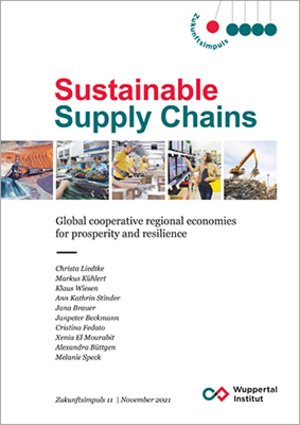
Two thirds of today's world trade is based on global value chains and supply networks. Purely regional supply chains have become less important in recent decades. The effects of these globalised structures are manifold. On the one hand, they promote employment and generate prosperity. On the other hand, they are beset by extreme social, ecological and economic imbalances.
The COVID-19 pandemic has demonstrated the fragility of existing supply chain systems. The lockdown continues to disrupt complex supply chains and many problems of existing production and consumption continue to worsen. COVID-19 is one example of the crises that can shake globally networked supply chains in the short term. Other crises, such as climate change, develop more insidiously and are less immediately recognisable. Different as they are, such crises have one thing in common: they highlight the vulnerability of global social and economic structures and illustrate the impact of global trade on the regions and people of the world.
This is precisely where global sustainability strategy comes in – it aims to fundamentally reduce differences and inequalities in opportunities and quality of life. The COVID-19 pandemic has forced the entire world into upheaval, creating an opportunity to make sustainability a central political resilience strategy.
In the wake of the Corona pandemic, the discussion about resilient communities has flared up. In order to guarantee supply in the face of such crises, these should be more strongly regional and circular in their economic approach and global and sustainable in their perspective. The aim should be sustainable, transparent, non-exploitative supply chains that guarantee the security of supply to cover basic needs and public services despite sudden changes and crises.
This discussion paper draws a future scenario of globally cooperative, circular regional economies that fundamentally reduce global inequalities in opportunities and quality of life, while at the same time permanently preserving the natural foundations of life.
Christa Liedtke, Markus Kühlert, Klaus Wiesen, Ann Kathrin Stinder, Jana Brauer, Janpeter Beckmann, Cristina Fedato, Xenia El Mourabit, Alexandra Büttgen, Melanie Speck:
Sustainable Supply Chains – Global Cooperative Regional Economies for Prosperity and Resilience
Wuppertal, 2021
(Zukunftsimpuls no. 11)
